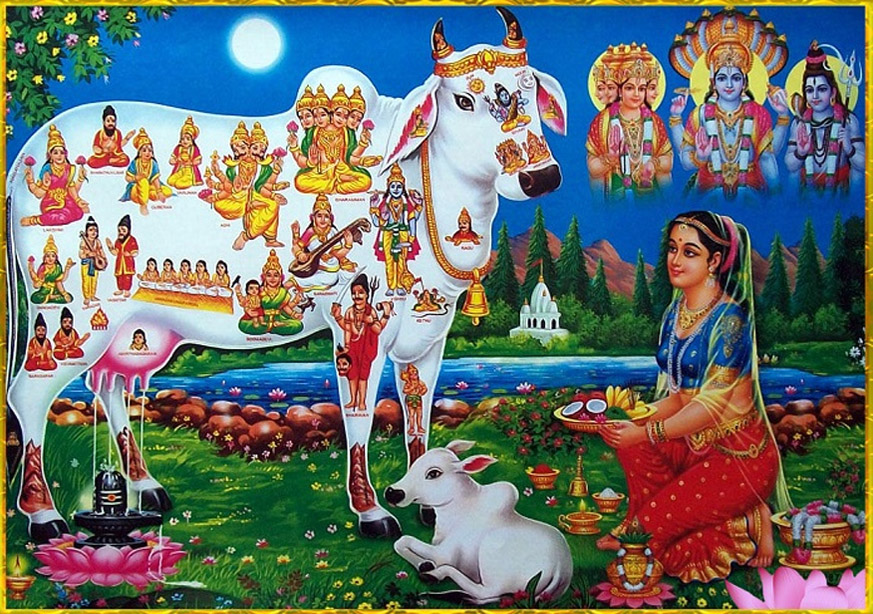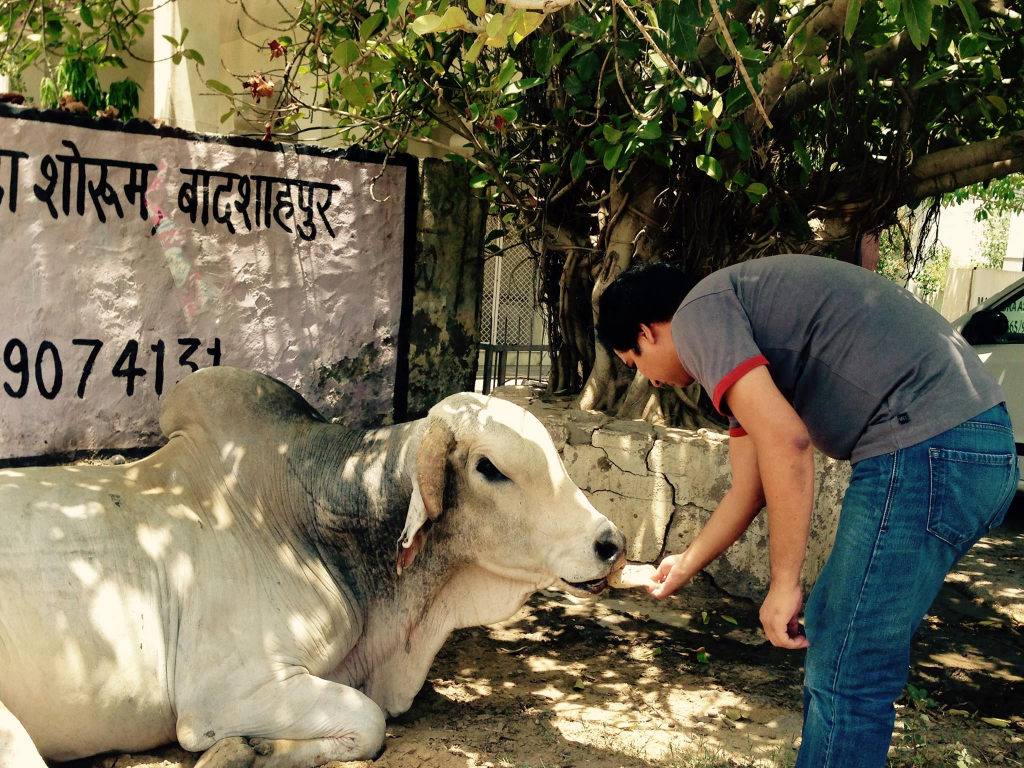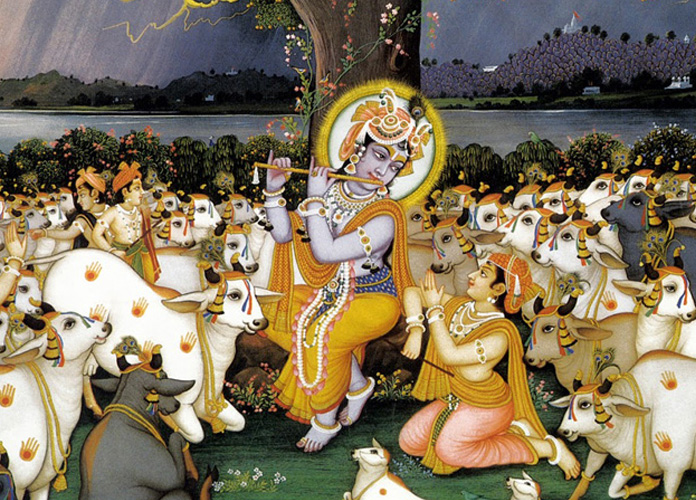Govatsa Dwadashi or Govatsa Dvadasi also known as “Nandini Vrat”, “Vagh Baras”, “Vasu Baras” is one of the auspicious Hindu festivals which marks the beginning of Diwali celebrations. You may wonder what is the significance of Govatsa Dwadashi, isn’t it?. In this article, I will share some of the important cultural aspects of this festival.
Govatsa Dwadashi is a sacred Hindu festival dedicated to the worship of cows and calves as symbolic gesture for offering love, gratitude and respect to cows for their help in sustaining the human life. In ‘Sanatan Dharma’, the Hindu religion recognizes the rights of animals to co-exist with humans; therefore, those who follow ‘Sanatan Dharma’ are taught to love, nurture and worship them without causing any harm to these innocent beings. ‘Sanatan Dharma’ in Hinduism, refers to various teachings from the Vedas, Upanishads, and other Hindu sacred texts such as the Ramayana and Bhagavad Gita, which are revered as concise guides to Hindu philosophy and Self realization. As described in the Hinduism sacred texts, various Hindu gods and goddesses incarnated in various animal forms. The cow is one of the most sacred of all the animals in Hinduism. It is known as Kamadhenu, or the divine cow, and the giver of all desires. Sanskrit name for Cow is ‘Gau’, ‘Dhenu’. Cows are venerated in India, and considered sacred beings since Sri Krishna, the central Supreme deity who reincarnated as a cowherd is said to be the ‘Protector of Cows’. So, when you get a chance, do worship cows, visit gaushalas and feed the cows grass and cattle feed. I strongly believe we should never forget our roots and always practice rituals of great traditional value.
Significance of Govatsa Dwadashi (Nandini Vrat)
Govatsa Dwadashi (Dwadashi or Dvadasi in Sanskrit means twelve) is observed on the 12 day of ‘Krishna Paksha’ (period of waning phase of Moon) in the ‘Ashwin’ month of traditional Hindu calendar. Govatsa Dvadasi is observed one day before the celebrations of ‘Dhanteras’. In the state of Maharashtra, the festival is celebrated by the name ‘Vasu Baras’ while in Gujarat, it is celebrated as ‘Vagh Baras’. In other northern states, Govatsa Dwadashi is referred to as Vagh, which implies repaying one’s financial debts. On this day, businessmen clear all their accounts and refrain from making any transactions. The festival of worshipping cows is symbolic for abundance and prosperity.
According to ‘Bhavishya Purana’, it is stated that when the devotee observes fast on dwadashi tithi, he/she shall be cleansed off their sins. It is believed that Govatsa Dwadashi was first observed with fasting, by King Uttanapada (the son of Svayambhuva Manu) and his wife Suniti. They were blessed with son Dhruva because of their prayers and fast on the day of Govatsa Dwadashi. According to legendary tale in ‘Vishnu Purana’, Svayambhu Manu (Son Of Lord Brahma), had three daughters and two sons; Priyavarta and Uttanapada. King Uttanapada had two sons; Uttama by his favorite young queen Suruchi and Dhruv by his older queen Suniti. Dhruv is the grandson of Svayambhu Manu and great grandson of Lord Brahma. Dhruv is an ardent devotee of Lord Vishnu. As a child, once Dhruv got disappointed for not getting his father’s love and attention, he had performed strong penance to please Lord Vishnu. Dhruv fasted for days and observed strict penance, looking a little boy’s sincerity and devotion, Lord Vishnu appeared before him. Lord Vishnu pleased by his pious devotion granted him boon with the highest seat above the three world and rewarded him as ‘Dhruv Nakshatra’ (The Pole Star) who will be the main anchor and sustainer of the stars and planets. It is believed that when devotees perform ‘Satvik’ duties on the day of Govatsa Dwadashi, observe fast (by not taking wheat or milk) and offer prayers to Dhruv Nakashatra on this day will be free from their sins. (In my subsequent blogs, I will share the beautiful legendary story of Dhruv as described in ‘Vishnu Purana’.)
Devotees who worship cows on this day are bestowed with peace, happiness and healthy life.

How to worship and perform puja on Govatsa Dwadashi?
The festive fervor of the ‘Festival Of Lights’ starts with celebration and worshipping of the cows, bulls and oxen on the day of Govatsa Dwdashi. It is believed that Cows bring happiness and prosperity to entire family. On this day following rituals are performed.
- In the early morning, devotees listen to devotional bhajans. Homes, streets and gaushala’s are adorned with flowers and earthern lamps. The air is filled with the mystical piousness livened with the aromatic smell of sweets, flowers and incense sticks.
- Cows, and calves are bathed, draped in clothes and adorned with flower garlands.
- Cows are then anointed with kumkum and turmeric powder as symbol of purity and sacredness and special aartis are performed.
- Cows are fed with gram, moong bean sprouts and special wheat products.
- Devotees visit temples and offers prayers to Sri Krishna and Sri Vishnu on this day.
- Mothers keep ‘Nandini Vrat’ for the long and healthy life of their kids. It is also believed that many couples who wish to have kids worship cow on this day and observe fast to be blessed with a child.

I would like to share this image of my husband Anil feeding Chappati (wheat bread) to an abandoned old ox in India. At our home, we fed a chappati daily to cow or an ox the first Chappati of the cooked meal. If this inspires you in any way please feed them food and water if you spot them on roadside scavenging for food. Now a days, in India, the sight of cows scavenging food on the streets and garbage site is dreadful. Sometimes, you often see cows injured or simply abandoned because they are old. I think we must do all that we can to ease the pain of these innocent beings. If you strike an emotional chord with my sentiments, do spread the word as far as possible. Let us collectively and voluntarily help these cows in whatever capacity we can.
If you enjoyed reading my blog, please share with your friends and family. Let us spread positivity and happiness to all near and dear ones around us. Do subscribe to my blog for more interesting posts like this.
Stay happy, stay blessed. Happy Diwali to everyone.




